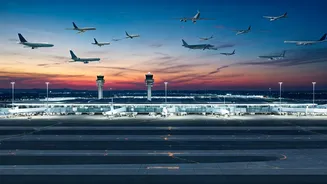Controller Shortage Emerges
The air traffic control system experienced a significant challenge with a noticeable scarcity of personnel. This personnel shortage directly impacted flight
operations at Los Angeles International Airport (LAX). The resulting halt in flights entering LAX showcased the essential function that air traffic controllers serve. It became evident how critical these individuals are in ensuring the safe and efficient movement of aircraft. The shortage caused a ripple effect, potentially leading to delays and inconveniences for passengers arriving at or connecting through LAX. This event highlighted the vulnerabilities inherent in air travel systems, emphasizing the need for robust staffing plans and contingency measures within air traffic control to avoid such disruptions in the future. The incident prompted a closer examination of the resources allocated to air traffic control, with discussions on the importance of maintaining sufficient staffing levels and providing adequate training for controllers.
Flight Operations Disrupted
The controller shortage immediately translated into tangible issues for airlines and travelers. Flights scheduled to land at LAX were directly affected, and the consequences of these changes were quickly felt. The temporary cessation of incoming flights aimed to manage the increased workload on the available air traffic controllers. This was a necessary step to ensure the safety and manage the flow of aircraft. The disruption meant altered flight schedules, possible grounding of flights, and cascading effects on connecting flights. Passengers faced the uncertainty of delayed arrivals, missed connections, and overall interruptions in their travel plans. Airlines were compelled to reroute flights or hold them at their origin airports, leading to added logistical challenges and possible financial repercussions. The impact of the controller shortage underscored the need for resilient operational strategies and the ability to respond promptly to unforeseen challenges within the air travel network.
Impact on Passengers
The flight halts and delays created notable inconveniences for individuals traveling to and from LAX. Travelers found themselves navigating uncertainty as their planned itineraries were compromised. Those awaiting inbound flights faced prolonged waiting times, and those with connecting flights worried about making their next departure. Passengers experienced schedule changes, potential missed flights, and altered travel arrangements. This stressful situation emphasized the human aspect of operational disruptions. Individuals may have missed important meetings, family events, or other crucial appointments. The incident underscored the importance of effective communication and passenger support systems during unforeseen travel disruptions. It also shed light on the need for airlines and airport authorities to collaborate in providing passengers with timely information, assistance, and support to alleviate some of the stress caused by the situation.
Air Traffic Control's Role
The events underscored the crucial role air traffic controllers play in the aviation industry. Controllers are responsible for managing the flow of air traffic. Their task is ensuring the safe and organized movement of aircraft through the skies and on the ground. The recent disruption highlighted how vulnerable the system is when faced with a shortage of personnel. It highlighted the complex logistics involved in air travel, where efficient operations hinge on a coordinated system. The controller's primary job is to provide guidance to pilots, monitor aircraft positions, and prevent potential conflicts in the air. This essential function demands highly trained professionals capable of making quick, accurate decisions under pressure. Their expertise is essential for both the safety and effectiveness of air travel, making them indispensable components of the entire aviation network. The events emphasized how a properly staffed air traffic control system is essential for maintaining seamless air travel.
Future Considerations
The incident involving the air traffic controller shortage will influence future strategies in air travel management. It emphasized the need for a proactive approach to staffing and resource allocation. Airport authorities and aviation stakeholders will likely re-evaluate staffing levels and make plans to address potential personnel shortages. This might involve improved recruitment strategies, enhanced training programs, and the implementation of backup plans to manage unforeseen situations. This event serves as a reminder of the fragility of complex systems and the need for preparedness. This includes adopting strategies and technologies that can improve the efficiency and reliability of air traffic control. The ultimate goal is to enhance the resilience of the aviation infrastructure and minimize the impact of future disruptions on both airlines and travelers. This experience will likely lead to a strengthened, more stable system.















![[WATCH] 'Real Madrid, Ramadan and rest' - Mohammed Siraj how last-minute World Cup call-up changed February plan](https://g-mob.glance-cdn.com/public/fc/image/ByYT_LEmlrD0.webp)
